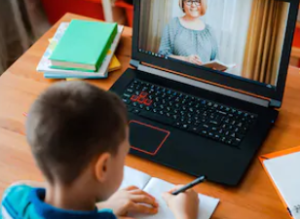Educating and Parenting: The Struggle to Learn Remotely
by Beth
 In his introduction to a story on NPR a few weeks back, Morning Edition host David Greene pointed out that here in the United States, more than 7 million school children receive special education services. “But this spring, many of those vital services, like physical therapy, simply stopped,” he said. “So what happens now with some districts planning to continue remote learning in the fall?” To answer that question, NPR took an approach like we’ve been taking with our Education and Parenting blogs lately. Just like us, they went to experts: the parents of the children with disabilities.
In his introduction to a story on NPR a few weeks back, Morning Edition host David Greene pointed out that here in the United States, more than 7 million school children receive special education services. “But this spring, many of those vital services, like physical therapy, simply stopped,” he said. “So what happens now with some districts planning to continue remote learning in the fall?” To answer that question, NPR took an approach like we’ve been taking with our Education and Parenting blogs lately. Just like us, they went to experts: the parents of the children with disabilities.
The story features a Minnesota mom with a third grader who struggles with auditory processing, and a mom in Rhode Island whose son has cerebral palsy and a cluster of other conditions.
The mom with the third-grader said her daughter had a hard time keeping up with teacher’s using an iPad. “They’d tell her, you know, look at this problem, look at that problem, no, show me your worksheet…” she said. “I mean, the teachers were doing the best they could, but all those rapid verbal directions just overwhelmed her.” The result? Her daughter has gone from loving school to dreading it.
The boy in Rhode Island who has cerebral palsy loves school but got little of the therapy he needed last spring while school was online only. His mother, a single parent, needs him to be in school this fall so she can work. But how can she send him to school if it’s going to be a health risk? “One more mistake could land him in the hospital,” she says, worrying that a hospital stay like that could be fatal.
Like so many other COVID-related stories these days, this one offered few solutions. That said, I was pleased that NPR found the issue important enough to give it air time. The reporter ended the story by explaining that a handful of lawsuits have been filed by parents and advocates around the country arguing that schools broke federal disability law by providing insufficient services in the spring. “Disability rights experts say this fall, schools have to do better for the parents who are angry or ready to give up, for the schools that know they could face legal consequences if they don’t, and, most importantly, for the kids for whom remote learning wasn’t just inconvenient or boring, but a painful absence of vital care for months that could set them back for years.”
Stay tuned to the Easterseals National blog for a two-part Education and Parenting post by a speech-language pathologist doing all she can to treat the young children in her practice remotely.






